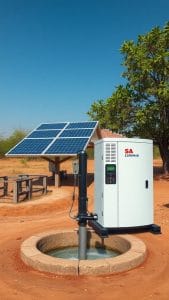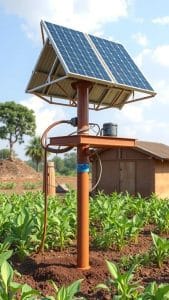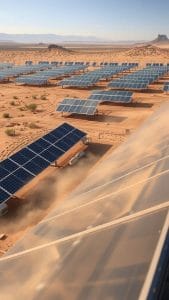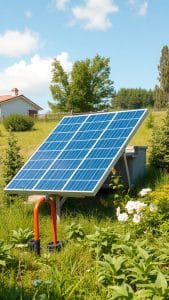Understanding Solar Panel Degradation: How Efficiency Changes Over 25 Years
What Happens to Solar Panels Over Time?
Solar panels are designed to produce clean energy for many years, but like all technology, they don’t remain at peak performance forever. Over time, solar panel degradation occurs, causing a gradual reduction in their ability to convert sunlight into electricity. Understanding how this efficiency changes over a typical 25-year lifespan can help you set realistic expectations for your solar investment.
Why Do Solar Panels Degrade?
Several factors contribute to the degradation of solar panels. These include:
- Environmental Exposure: Constant exposure to sunlight, heat, wind, rain, and snow takes a toll on solar panels.
- Thermal Cycling: Repeated heating and cooling cause materials inside the panels to expand and contract, affecting their structure.
- UV Radiation: Ultraviolet rays from the sun slowly break down the materials atop the solar cells.
- Physical Wear: Dust, dirt, and pollution can accumulate and cause small but damaging impacts.
- Manufacturing Quality: The type of solar panel technology and quality of materials used influence how much and how quickly degradation happens.
Typical Rates of Solar Panel Degradation
On average, solar panels degrade at a rate of about 0.5% to 1% per year. This means:
Inverter Not Working? Get Emergency Repair!
Don't let a broken inverter leave you without power. Our certified technicians provide same-day diagnosis.
Get Emergency Repair Now →- After 10 years, a panel might operate at about 90% to 95% of its original capacity.
- After 25 years, performance generally drops to around 75% to 85% of the starting efficiency.
Some higher-quality panels can have degradation rates as low as 0.3% per year, while less expensive or lower-quality products may degrade faster. It’s helpful to look for panels with performance warranties that guarantee a minimum efficiency after a certain number of years, often 25.
How Degradation Impacts Your Energy Production
Reduced efficiency means lower energy output, which directly affects how much electricity your solar system generates over time. For example, if your solar panel system produced 5 kilowatt-hours (kWh) daily when new, after 25 years it might only generate about 3.75 to 4.25 kWh daily, depending on the degradation rate.
While this reduction might seem significant, solar panels are built to continue producing energy long after their warranty periods. The key is to understand that slight efficiency loss is normal and factored into the long-term financial savings calculations.
Inverter Not Working? Get Emergency Repair!
Don't let a broken inverter leave you without power. Our certified technicians provide same-day diagnosis.
Get Emergency Repair Now →Identifying Factors That Affect Longevity
To help maintain your solar panels’ efficiency and slow degradation, consider these key factors:
- Quality of Installation: Proper mounting and wiring reduce mechanical stress and potential damage.
- Regular Maintenance: Cleaning off dirt and debris ensures panels receive maximum sunlight exposure.
- Environmental Conditions: Panels installed in extreme climates may degrade faster due to harsher weather.
- Technological Advances: Modern panels incorporate materials and designs that resist degradation better.
Monitoring Solar Panel Performance Over Time
Keeping track of your solar system’s output can alert you to unexpected drops in efficiency, which could be caused by factors other than natural degradation, such as shading or electrical issues. Many solar systems come with monitoring tools, either through apps or web dashboards, allowing you to see real-time performance data.
Paying attention to these metrics empowers you to address problems quickly, helping your solar panels last longer and operate closer to their original efficiency.
Inverter Not Working? Get Emergency Repair!
Don't let a broken inverter leave you without power. Our certified technicians provide same-day diagnosis.
Get Emergency Repair Now →Choosing Solar Panels with Longevity in Mind
When selecting solar panels, consider products that offer strong performance warranties and use durable materials. Look for panels with:
- Warranties guaranteeing at least 80% efficiency after 25 years.
- Low annual degradation rates, ideally below 0.5% per year.
- Good resistance to environmental stress tested by independent studies.
Investing in quality panels upfront can save you money in the long run and provide more reliable energy production throughout the life of your solar system.
Expectations for Solar Panel Efficiency at 25 Years
By the time your solar panels reach 25 years of age, expect them to operate at about 75% to 85% of their initial efficiency under normal conditions. This rate reflects gradual wear rather than sudden failure. Many homeowners find that after 25 years, panels continue to produce energy effectively, even if slightly reduced.
Inverter Not Working? Get Emergency Repair!
Don't let a broken inverter leave you without power. Our certified technicians provide same-day diagnosis.
Get Emergency Repair Now →Keep in mind, this degradation timeline is based on averages. Individual panel performance can vary depending on location, maintenance, and quality.
How Solar Panel Degradation Affects Your Energy Savings
Your savings on electricity bills may decrease modestly as panels degrade because they produce less electricity. However, solar energy remains competitive compared to grid energy prices, especially with rising utility costs and incentives.
Planning for degradation means factoring in future production losses when estimating your overall return on investment. This realistic outlook helps you avoid surprises and appreciate the long-term value of solar power.
Inverter Not Working? Get Emergency Repair!
Don't let a broken inverter leave you without power. Our certified technicians provide same-day diagnosis.
Get Emergency Repair Now →Steps to Extend Solar Panel Life
To maximize the lifespan and efficiency of your solar panels, you can:
- Schedule regular professional inspections to identify minor problems early.
- Clean panels periodically to prevent dirt buildup that blocks sunlight.
- Ensure trees or new construction do not shade your panels over time.
- Choose high-quality inverters and mounting hardware to complement your panels.
By taking these measures, you minimize unnecessary efficiency loss and keep your solar system producing clean energy for decades.
Final Thoughts on Solar Panel Degradation
Understanding how solar panels degrade over 25 years helps you make informed decisions about installation, maintenance, and expectations. While a gradual decline in efficiency is inevitable, modern panels degrade slowly enough to offer reliable energy production and solid financial benefits over the long term.
Inverter Not Working? Get Emergency Repair!
Don't let a broken inverter leave you without power. Our certified technicians provide same-day diagnosis.
Get Emergency Repair Now →By investing in quality products, monitoring performance, and maintaining your system properly, you ensure that your solar energy setup remains a smart, sustainable choice for years to come.
Factors Influencing the Longevity and Performance of Solar Panels in Long-Term Use
When you invest in solar panels, understanding what affects their performance and longevity can help you get the most out of your system. Solar panels are designed to last for decades, but various factors influence how well they work over time. By getting familiar with these elements, you can make smarter choices about purchasing, maintenance, and expectations.
Quality of Solar Panel Materials
The first and most important factor is the quality of materials used in the solar panels. High-quality solar panels tend to use advanced photovoltaic cells and better protective glass covers, which enhance durability and efficiency. Panels with superior manufacturing standards generally experience less degradation over time. If you’re choosing between brands or models, consider checking for certifications like IEC 61215 and IEC 61730, which indicate reliable construction and safety standards.
Inverter Not Working? Get Emergency Repair!
Don't let a broken inverter leave you without power. Our certified technicians provide same-day diagnosis.
Get Emergency Repair Now →Environmental Conditions Affecting Solar Panels
Your panels’ location plays a major role in performance longevity. Certain environmental factors can accelerate wear and tear on the solar panels:
- Temperature Variations: Extreme heat can reduce panels’ efficiency temporarily and may contribute to faster material degradation.
- UV Exposure: Constant exposure to sunlight causes UV rays to slowly break down the surface materials, which lowers power output.
- Weather Events: Hailstorms, strong winds, heavy snow, and rain can physically damage panels or their mounting systems.
- Pollution and Dust: Accumulated dirt and pollutants reduce the sunlight reaching cells unless cleaned regularly, indirectly influencing performance deterioration.
Installation and Mounting Practices Matter
Even with the best panels, improper installation will harm long-term results. How your solar panels are mounted affects both efficiency and reliability. For example, poor electrical connections or incorrect tilt and orientation reduce energy capture immediately and can cause damage over time. Good installers also ensure that the mounting hardware resists corrosion and withstands local weather conditions.
Maintenance and Routine Cleaning
Regular maintenance is key to preserving solar panel performance. Solar panels need occasional cleaning to remove dust, bird droppings, or leaves. These obstructions block sunlight and cause tiny hot spots where cells heat unevenly, which leads to earlier degradation. Inspecting wiring and connectors annually helps prevent efficiency drops caused by loose connections or moisture ingress.
Inverter Not Working? Get Emergency Repair!
Don't let a broken inverter leave you without power. Our certified technicians provide same-day diagnosis.
Get Emergency Repair Now →Energy Output Degradation Rate Explained
All solar panels experience degradation, meaning their energy output decreases slightly every year. Most modern panels come with warranties guaranteeing about 80-90% of original performance after 25 years. This equates to an average degradation rate of roughly 0.5% to 1% per year. However, this rate varies depending on the quality of panels and exposure conditions. Knowing this rate helps you estimate how much electricity your panels will produce years down the line.
Technology Type Influences Durability
Solar panels come in different types, primarily monocrystalline, polycrystalline, and thin-film, each with distinct longevity profiles:
- Monocrystalline Panels: These offer the highest efficiency and tend to have the slowest degradation rates.
- Polycrystalline Panels: Slightly less efficient and may degrade faster but often come at a lower cost.
- Thin-Film Panels: These are lightweight and flexible but typically show higher degradation compared to crystalline types.
Impact of Temperature Coefficients
The temperature coefficient tells you how much panel efficiency drops for every degree increase in temperature above 25°C (77°F). Panels with a lower temperature coefficient perform better in hot climates and maintain their output with less loss as temperatures rise. This is crucial if you live in a region with especially hot summers, as sustained overheating shortens panel lifespan.
Inverter Not Working? Get Emergency Repair!
Don't let a broken inverter leave you without power. Our certified technicians provide same-day diagnosis.
Get Emergency Repair Now →System Components and Their Roles
It’s not only the panels that affect system longevity. Components like inverters, wiring, and mounting structures also influence overall durability and performance:
- Inverters: These convert DC power to usable AC electricity and usually have shorter lifespans than panels, requiring replacement every 10-15 years.
- Wiring: Insulation quality and protection against moisture keep electricity flowing efficiently without losses.
- Mounting Hardware: Durable racks resist corrosion and withstand weather, preventing physical stress on panels.
User Habits and System Monitoring
Day-to-day user care impacts how well solar panels hold up. Installing monitoring systems lets you track output and spot issues right away, leading to quicker fixes and less hidden damage. Avoid placing heavy objects on panels, trimming nearby trees to reduce shading, and keeping an eye out for physical damage after storms. With proactive care, your solar panels can serve reliably for 25 years or more.
Understanding what influences solar panel longevity empowers you to maintain their efficiency and protect your investment. Factors like material quality, environmental exposure, installation, and maintenance all play vital roles in keeping your solar system productive long-term. By choosing wisely and caring for your panels properly, you can enjoy sustainable energy output over their entire lifespan.
Inverter Not Working? Get Emergency Repair!
Don't let a broken inverter leave you without power. Our certified technicians provide same-day diagnosis.
Get Emergency Repair Now →Conclusion
Solar panel degradation is a natural process that impacts the efficiency of your solar energy system over time. Understanding that solar panels typically lose a small percentage of their capacity each year—often around 0.5%—helps set realistic expectations for what you can expect over a 25-year period. After two and a half decades, most panels still operate at about 80% to 85% of their original efficiency, which means they continue to provide substantial energy savings.
Several factors play a key role in determining how quickly solar panels degrade. Exposure to harsh weather, temperature fluctuations, and shading can all influence performance. Additionally, the quality of the solar panels and the installation process significantly affect longevity. Choosing high-quality products and professional installation can help ensure your panels last longer and maintain better efficiency over time.
Knowing these details empowers you to plan better for your solar energy investment. Regular maintenance, such as cleaning and timely inspections, can also slow degradation and improve performance. By keeping these points in mind, you can enjoy the benefits of solar power for decades, confidently relying on your system’s long-term value and sustainability.
Inverter Not Working? Get Emergency Repair!
Don't let a broken inverter leave you without power. Our certified technicians provide same-day diagnosis.
Get Emergency Repair Now →Ready to discover your solar potential?
Our calculator shows you exact savings projections for your home.







